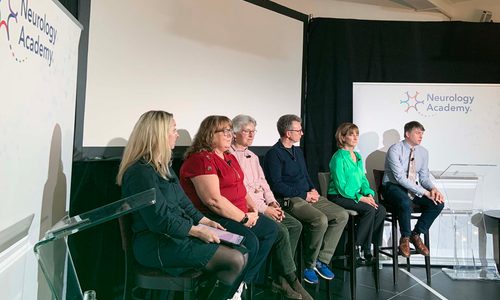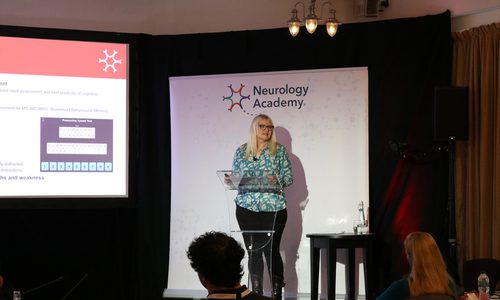Interview with Gilly Burdon for World Occupational Therapy Day and OT Week 2025
News
The Royal College of Occupational Therapists: www.rcot.co.uk
Occupational therapists (OTs) play a vital role in helping people with neurological conditions live full, meaningful lives. Working across community, hospital and hospice settings, OTs focus on enabling individuals to do the things that matter most to them – from returning to work and maintaining independence to adapting their daily routines and environments as their needs change.
In neurology, occupational therapy is central to holistic, person-centred care. Whether supporting someone newly diagnosed with multiple sclerosis, navigating brain fog, fatigue (Occupational Therapy in Fatigue Management in Multiple Sclerosis: An Umbrella Review - Salomè - 2019) or multiple symptoms management in the work environment; to helping a person with Parkinson’s manage fatigue and maintain activity; or advising on home adjustments for someone with motor neurone disease. OTs help people stay engaged in the roles and activities that define who they are (Occupational therapy interventions for multiple sclerosis: A scoping review).
In conversation: Ruth Stross and Gilly Burden
As we reflect on World Occupational Therapy Day earlier this week, and look ahead to Occupational Therapy Week next week, we’re celebrating the OTs whose expertise and compassion make such a difference across neurological care. Our head of nursing Ruth Stross, sat down with Gilly Burdon, occupational therapy team lead for the community neurology team at Wye Valley NHS Trust, to talk about the role of OTs in neurology, supporting people to live well and helping them stay active, independent and engaged in meaningful occupations, including work. Gilly’s team supports people across Herefordshire living with conditions including Parkinson’s, multiple sclerosis and motor neurone disease.
You can watch their full conversation below.
Supporting people through every stage of their journey
Gilly described the privilege of supporting people with neurological conditions from diagnosis through to end-of-life care. By building long-term relationships, her team develops deep trust with patients and their families, helping them adjust to change, learn self-management strategies and access the right support at the right time.
A key strength of the Wye Valley team is its multidisciplinary approach. OTs work closely with physiotherapists, specialist nurses, speech and language therapists, dietitians and palliative care teams – often through joint visits or shared clinics – to provide seamless, joined-up care.
“Occupational therapy in action”
Reflecting this year’s OT Day theme, Occupational Therapy in Action, Gilly highlighted how OTs empower people to engage in meaningful activities, even when their physical abilities change.
“Our whole philosophy is about keeping people doing the things that are important to them – whether that’s through rehabilitation to regain function, or by helping them find new ways to do the same tasks differently.”
Gilly Burdon
The importance of vocational rehabilitation
A major part of Gilly’s work and passion is vocational rehabilitation: supporting people to stay in, return to, or leave work well. She explained that many people with neurological conditions leave work earlier than they need to, often due to lack of understanding or support in the workplace. Her team’s proactive approach focuses on early intervention, education and empowering patients to request reasonable adjustments.
“Sometimes, it’s as simple as asking, ‘How is work?’ early on. That opens the door to conversations that can prevent a crisis later. We want people to know they have rights, and that small changes can make a big difference.”
Gilly shared moving stories of people who, with OT support, were able to remain in work – regaining confidence and independence in the process.
Collaboration at the heart of care
Gilly also spoke about the value of collaboration, describing how OTs thrive within multidisciplinary teams:
“We love working collaboratively. Joint visits, shared discussions, and seeing things from each professional’s perspective – it all helps us deliver the best outcomes for our patients.”
Working together at Neurology Academy
At Neurology Academy, we are proud to work closely with occupational therapists and all allied health professionals across our programmes. OTs don’t just attend our courses and webinars – they lead, teach and shape them. Through our AHP faculty, we promote leadership, education and integrated models of care that recognise the unique expertise of every professional involved in neurological care.
This World Occupational Therapy Day and OT Week, we want to say thank you to every OT who has taught, spoken or learned with us. Your skills and compassion are transforming the lives of people with neurological conditions every day.
Useful links:
The Occupational Therapy Show: 26-27th November 2025, Birmingham
The Royal College of Occupational Therapists: Learn more about occupational therapy or become a member
Therapists in MS (TiMS): Our MS MasterClasses are endorsed by TiMS
- Examples of Neurology Academy delegates projects from occupational therapy colleagues:
Brain health and occupational therapy, Fiona Barclay
The occupational therapy role in a new multi-professional dementia diagnostic pathway, Pauline Carlyle
Occupational Therapy Intervention… Who Knew!, Clare Johnson
Related articles
Uniquely practical education, producing specialist clinical leaders transforming local healthcare
Neurology Academy is an innovative educational provider for healthcare professionals including consultants, specialist nurses, pharmacists, therapists and other allied health professionals. Our courses are developed by practicing specialists who combine their experience and expertise into case-based learning designed to create specialists in their field with confidence in effecting change.






